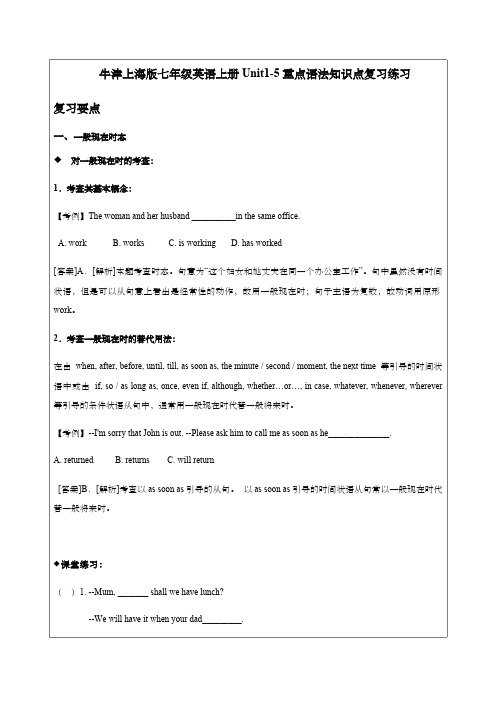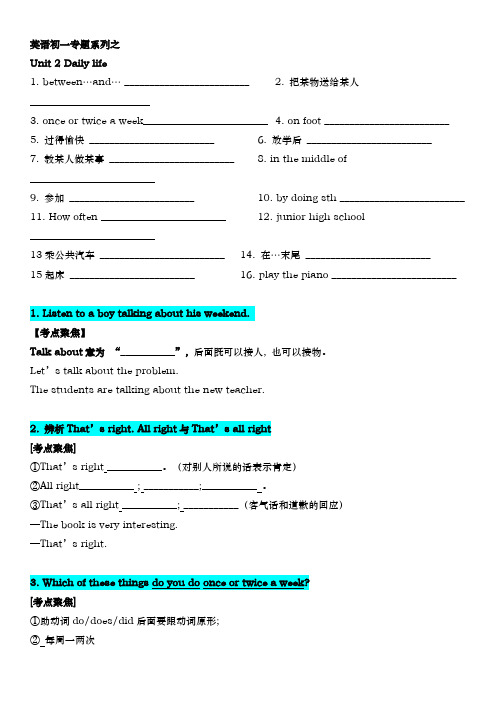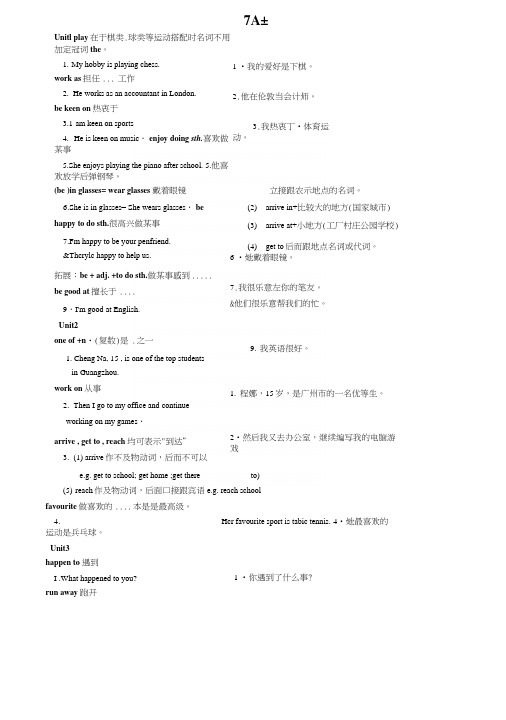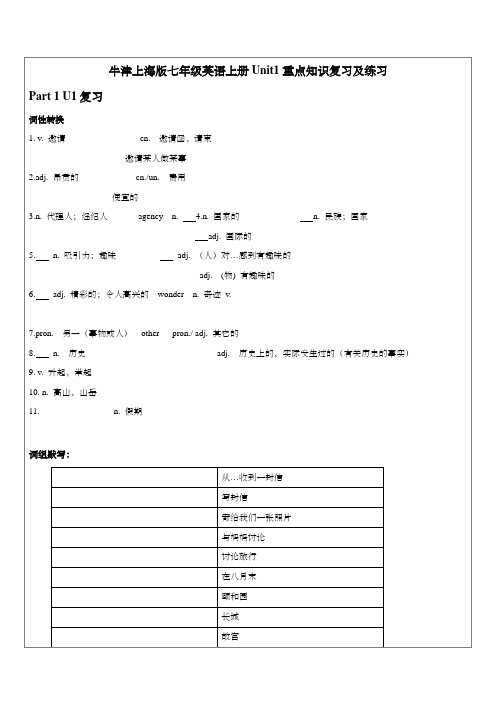广州英语(上海牛津版)复习资料『七年级上』
牛津上海版七年级英语上册Unit1-5重点语法知识点复习练习

A. when; returnsB. where; returnsC. where; will returnD. when; will return()2. --Tomorrow will be Father's Day. What will you do for your father? -- I will say "I love you, Daddy" as soon as he _______ up.A. will wakeB. is wakingC. wakesD. woke()3. Our teacher said light________ faster than sound.A. travelledB. has travelledC. is travellingD. travels()4. --Let's go fishing if it _______ this weekend. --But nobody knows if it_______.A. is fine, will rainB. will be fine, rainsC. is fine, rainsD. will be fine, will rain()5. --Is your father a doctor? --Yes, he is. He________ in Town Hospital.A. has workedB. had workedC. worksD. WorkedACDAC二、一般过去时态(1)表示过去某个时间所发生的动作或存在的状态。
常和表示过去的时间状语yesterday, last week, an hour ago, just now, the other day, in 1982, then, at that time, in the past等连用。
e.g.:Where did you go just now? 刚才你上哪儿去了?(2)表示在过去,经常或反复发生的动作。
沪教牛津版广州英语七年级((上册))Unit2讲义全

英语初一专题系列之Unit 2 Daily life1. between…and… _________________________2. 把某物送给某人________________________3. once or twice a week_________________________4. on foot _________________________5. 过得愉快_________________________6. 放学后_________________________7. 教某人做某事_________________________ 8. in the middle of_________________________9. 参加_________________________ 10. by doing sth _________________________ 11. How often _________________________ 12. junior high school_________________________13乘公共汽车_________________________ 14. 在…末尾_________________________15起床_________________________ 16. play the piano _________________________1. Listen to a boy talking about his weekend.【考点聚焦】Talk about意为“___________”,后面既可以接人, 也可以接物。
Let’s talk about the problem.The students are talking about the new teacher.2. 辨析That’s right. All right与That’s all right[考点聚焦]①That’s right ___________。
上海版牛津英语七年级 上 unit3单元知识点及练习

复习unit3 单词、短语、重点句子和语法一、单词:核心词汇名词可数名词field — a field — two fieldsquiz — a quiz —three quizzesa ground — four groundsland — a land — two landsproblem — a problem — four problemsFact — a fact — several facts不可数名词the Earth(地球)— the Moon(月亮) — the Sun(太阳)pollution(n.)— pollute(v.)=make sth dirtyenergy (n.) — clean energy(清洁能源)— heat energy(热能)二、短语/固定搭配:1、短语:provide …with…put…into…find out throw awaybe covered by on earthin the sky a lot ofmake energy of coursefor example one quarterthree quarters at hometake a look come fromfind out different types ofin the end get cooler2、固定搭配:call sth. sth.provide sb. with sth.stop doing sth.it be +形容词+ for sb. +to do sth.let sb. do sth.help sb. do sth.ask sb. (to) do sth.keep sb. + 形容词三、经典句型:There are also many people like you and me on earth.It is important for us to protect the earth for our future.What is the weather like in different places on earth?四、重点短语1.protect the Earth保护地球protect sb/sth from doing我们必须保护那片森林免受火灾。
牛津上海版七年级英语上册Unit8知识点汇总

牛津上海版七年级英语上册Unit8知识点汇总Unit8 Growing healthy, growing strongI 词组:1.diet and health 饮食和健康2. grow healthy 长得健康3. grow strong 长得健壮4. spend one’s weekend 过周末5.at Health Camp 在健康度假营6.go swimming 去游泳7.in the swimming pool 在游泳池里8.Neither do I. 我也不9.So do I. 我也是10.play badminton 打羽毛球11.read magazines 读杂志12.in the reading room 在阅览室13.in the hall 在大厅里14.a cartoon called…. 一部名为……的卡通片15.exciting and interesting 既激动又有趣16.That's a good idea. 那真是个好主意17.an outing 一次远足18.an information sheet 一张信息纸19.in the camp 在度假营里20.stay healthy and strong 保持健康和强壮21.to be a healthy child 做一个健康的孩子22.go to bed early 早睡23.get up early 早起24.exercise regularly 定期锻炼25.at least 至少26.eight glasses of water 八杯水27.too much sweet food 太多的甜食28.too many soft drinks 太多的软饮料29.good/ bad habits 好/坏习惯30.have a sore throat 喉咙痛31.have toothache 牙痛32.have a stomach ache 胃痛st Sunday 上周日34.three packets of crisps 三包薯片35.two boxes of ice cream 两盒冰淇凌36.some vegetables 一些蔬菜37.four bars of chocolate 四块巧克力38.three bottles of lemonade 三杯柠檬汁39.a lot of fried food 许多油炸食品40.enough fruit 足够的水果41.watch less TV 少看电视42.eat fewer crisps 少吃薯片43.eat more fruit 多吃水果44.change my bad habits 改变我的坏习惯ed to do sth. 过去常常做某事46.not… any longer. 不再47.do a lot of exercise regularly 有规律地做许多的运动48.study hard 努力学习49.in the past 在过去II. 词性转换:1. health n. 健康healthy a. 健康的unhealthy a. 不健康的2. call v. 叫喊;呼唤;打电话called a. 被叫做……的,名为……的3. regularly adv. 有规律地;正常地regular adj. 有规律的;正常的irregularly adv. 无规律地;不正常地irregular adj. 无规律的;不正常的4. many/much adj./ pron. 许多的/许多more adj./ pron. 更多的/更多5. few adj. 少数的;几乎没有的fewer adj. 较少的pron. 少数;几乎没有pron. 较少6. little adj. 少的less adj.较少的adv.少adv.较少地n. 没有多少n. 更少的数7. change v. 变化,交换change n. 变化;零钱changeable adj. 易变的,不定的8. suggestion n. 建议suggest v. 建议9 exciting adj.令人激动的excited 感到激动的10 interesting interestedInteresting places= places of interest be interested inIII. 语言点/句型:1.Mr Hu and the students are spending their weekend at Health Camp. 胡老师和学生在健康营度周末。
英语(上海牛津版)复习资料『七年级上』.docx

Unitl play 在于棋类.球类等运动搭配时名词不用加定冠词the 。
1. My hobby is playing chess. work as 担任 ... 工作2. He works as an accountant in London.be keen on 热衷于3.1 am keen on sports4. He is keen on music ・ enjoy doing sth.喜欢做某事5.She enjoys playing the piano after school. 5.他喜欢放学后弹钢琴。
(be )in glasses= wear glasses 戴着眼镜6.She is in glasses= She wears glasses ・ behappy to do sth.很高兴做某事7.Fm happy to be your penfriend.&Thcrylc happy to help us. 拓展:be + adj. +to do sth.做某事感到 .....be good at 擅长于 ....9・I'm good at English.Unit2one of +n ・(复数)是 . 之一1. Cheng Na, 15 , is one of the top studentsin Guangzhou.work on 从事2. Then I go to my office and continueworking on my games ・arrive , get to , reach 均可表示"到达”3. (1) arrive 作不及物动词,后而不可以立接跟农示地点的名词。
(2) arrive in+比较大的地方(国家城市) (3) arrive at+小地方(工厂村庄公园学校) (4) get to 后而跟地点名词或代词。
6 •她戴着眼镜。
牛津上海版七年级英语上册Unit1重点知识复习及练习

2) 形容词比较级+than the other+复数名词。
例如:Asia is bigger than the other continents on the earth.亚洲是地球上最大的洲◆形容词的常用结构:◇a + adj + n a tall boy ◇be + adj. He is tall.◇keep/find/make/think… it adj. to / that …… ◇be + as + adj. + as do + as + adv. + as1)形容词在句子中的句法作用及位置:⑴ 作定语,放在名......词的前面....,.修饰名词。
结构:a/an/ …_______ 名词 ★ 后置的情况:修饰复合不定代词时放在代词之后。
如:Something serious has happened to him .(他发生了严重的事故) 1. Every minute there is _____going on here.A. exciting somethingB. something excitingC. exciting anythingD. anything exciting 2. This river is about 5 feet ________. A. deep B. widely C. depth D. Length★ 少数形容词只能作定语这些形容词包括 little, live , elder, eldest 等,只能作定语,不能作表语。
例如:(正)My elder brother is a doctor. (误)My brother is elder than I. (正)This is a little house.(误)The house is little. (正)Do you want live fish or dead one?(误)The old monkey is still live.⑵作表语时放在连系动词之后,构成系表结构。
准初一生预习:七年级上册英语unit1重点单词短语及语法句型
准初一生预习:七年级上册英语unit1重点单词短语及语法句型以下内容是来自广州(深圳上海)牛津版的英语教材整理而成,供大家暑假预习用!今天先学7A UNIT 1 Making friends的内容!家长可以帮孩子收藏!Ⅰ重点单词:World n. 世界 country n. 国家 Japan n.日本Germany n. 德国 German adj.德国的 n.德国人grammar n.语法 blog n. 博客 sound n. 声音Everyone n.人人(谓语动词要用单数)Hobby n.爱好(复数hobbies) age n. 年龄elder adj. 年长的 dream n. 梦想 complete v. 完成Us pron.我们 yourself pron.你自己 friendly adj. 友爱的engineer n. 工程师 flat n.公寓 mountain n. 山Ⅱ重点短语:1.colse to 接近 = near 反义词:far (away)from 远离2.Go to school 去上学3.Be good at 擅长 =do well in 反义词:be bad /poor at=do badly in不擅长4.Make friends with 与……交朋友 make friends 交朋友5.All over 遍及6.I’d like to=would like to 愿意Ⅲ重点句型:1.what does···mean?2.welcome to3.I like···because···4.My dream is to be··?5.How old is/are ····?6.What does ····do?详细讲解:1.Read a German girl’s blog。
七年级上英语知识梳理(上海牛津版)U5-U6
Unit 5 Visiting the moon学习导图:Vocabulary1.more than:more than意思是“超过,多于。
〞如:The classroom can hold more than one hundred students.那间教室可以容纳一百多个学生。
[拓展]much/ many(原级)-more(比拟级)-most(最高级)2.one of:意为“....之一〞。
该短语后面的形容词通常用最高级,(one of+名词复数)如果该结构在句子中做主语时,谓语动词用第三人称单数。
如:Guangzhou is a one of the largest cities in China.某某是中国最大的城市之一。
One of the first students is from the UK.有一个学生是英国人。
:意为“离开“,常与介词for搭配,构成leave for sw.的结构,意思是“去某地〞。
[拓展] leave与e, go等趋向性动词一样,常常用现在进展时表示将来。
如:My father will leave Guangzhou for Beijing tomorrow.=My father is leaving Guangzhou for Beijing tomorrow.我爸爸明天要离开某某去。
leave作为动词,还可以意为“留下,遗忘,落下〞。
如:When you go to school, don’t leave your books at home.当你去上学时,别把书包忘在家里。
4.be able to:be able to do sth.意思是“能够做某事〞,能用于各种时态中,时态表现在be的变化中;表示“能够〞还可用情态动词can,但只有一般现在时和一般过去时两种时态,过去时用could。
[拓展]be able to与can的区分:be able to是指表示经过努力能达到目的的can是指表示有能力做某事。
广州英语七年级上(新沪教牛津版)Unit 4 Seasons 全面教案(附带练习题和答案)超级详细!!
Unit 4 seasons 重点短语:1.What about…? …怎么样?2.watch sb do sth看某人做某事3.make footprints留下足迹4.in the snow 在雪地里5.by the sea在海边6.start to do sth开始做某事7.get warm变暖8.blow gently/strongly轻轻地/猛烈地吹9.turn green变绿10.take a tip 去旅行11.shine brightly明亮地照耀12.go to the beach去海滩, 去海边13.swim in the sea在海里游泳14.go on a picnic = have a picnic 去野餐15.at this time of year在每年的这个时候16.love to do sth喜欢做某事17.make snowmen 堆雪人18.spend time with sb 花时间和某人在一起19.the Spring Festival春节20.have a long holiday度长假21.have fun=have a good tome玩得开心22.play …with sb和某人一起玩…23.at that time在那时24.fly kites 放风筝25.ride bikes骑单车26.get married 结婚27.knock on/at 敲打28.go swimming 去游泳29.in the middle/east of在…的中部/东部30.put forward 把…向前拨,向前移要点讲解:1. what about …?=how about…?意思为“…怎么样?”常用于询问消息或征询意见。
后面若跟动词要用ing形式如:What/How about going home now?2. Watch us go…看着我们离去watch sb. do sth. 看见某人做过某事(强调动作的全过程)watch sb. doing sth. 看见某人正在做某事(强调动作正在进行)类似用法的词还有:see, hear3.What is the weather like in spring? = How is the weather in spring? 春天天气怎么样?询问天气的常用句型:What is the weather like?=How is the weather?后面可接时间或地点的介词短语。
广州牛津版七年级上册知识点总结
七年级上册Unit 1 Making friends项目基本目标词汇 1 title n. 题目,标题2 greeting n. 问候3 dear adj. 亲爱的4 address n. 地址5 street n. 街道6 magazine n. 杂志7 hobby n. 业余爱好8 chess n. 国际象棋9 restaurant n. 餐馆10 as prep. 作为11 badminton n. 羽毛球12 tennis n. 网球13 engineer n. 工程师14 middle n. 中间15 age n. 年龄16 left n. 右边17 stand v. 站立18 around prep. 周围;围绕19 plete v. 填写〔表格〕;完成20 information n. 信息;资料21 grade n. 年级;成绩等级22 primary adj. 小学教育的23 captain n. 队长;组长;船长24 reply n. 回答25 choose v. 选择26 future n. 未来;将来27 difficult adj. 困难的28 handwriting n. 笔迹29 small adj. 小的30 sky n. 天;天空词组work as; be keen on; at school; in the middle; best wishes; in glasses; on the right; on the left; one of the best; in the world; next to; be friendly to; in the future; be kind to; do exercise; last for; at the beginning of; at the end of; go swimming; go to the sea; go skiingUnit 2 Our daily life项目基本目标词汇 1life n. 生活;生命2probably adv. 很可能;大概3most adj.〔数量上〕最多;最大4find v. 找到;发现5daily adj. 每日的;日常的6top adj.〔位置、级别或程度〕最高的7business n. 公司;生意8still adv. 还是;仍然;依旧9 wash v. 洗;洗脸〔或手等〕;洗澡10 uniform n. 制服;校服11 discuss v. 讨论12 make v. 做;使得13 twice adv. 两次14 club n. 俱乐部;社团15 once adv. 一次16 continue v. 继续17 brush v. 用刷子刷18 activity n. 活动19 guard n. 警卫;卫兵;看守20 construction n. 建筑;建造;施工21 dentist n. 牙科医生22 manager n. 经理;老板23 charge n. 主管;掌管;管理24 careful adj. 仔细的;慎重的;谨慎25 dangerous adj. 有危险的;不安全的26 parcel n. 包裹27 honestly adv. 诚实地28 mean v. 意思是;表示…的意思句型 1.I would like to...2.How many people are there in your family?3.What do they do?4.Here are some things about...5.What is your favourite...?语法1.特殊疑问词的用法2.定冠词、不定冠词的用法29 angry adj. 愤怒的;生气的30 hold v. 抱住;拿着;抓住31 husband n. 丈夫32 finger n. 手指33 except prep. 除…之外34 biology n. 生物词组the same as; find out; daily life; top student; have breakfast; make phone calls to; on the way to; have lunch; e back to; have dinner; work on; halfan hour; walk home; in charge of; look after; by bus; be late for; getangry; tell the truth; go jogging; except for; on weekdays句型 1.Once a week I have piano lessons.2.How often do you...?3.Can you tell me...?语法 1.一般现在时〔三单变形规那么〕2.频度副词及频度副词短语3.动词三单加“s〞及名词单复数读法Unit 3 Troubles项目基本目标词汇 1 deal v. 处理2 argue v. 争吵;吵架3 steel n. 钢4 purse n. 钱包5 follow v. 跟随6 hurry v. 匆忙;加速7 report v. 举报;报告8 minute n. 分钟9 side n. 一边;一旁;一侧10 river n. 江;河11 already adv. 已经12 project n. 课题13 hurt v. 受伤;伤害14 without prep. 不用;不带;没有15 guilty adj. 内疚的16 description n. 描写;形容;说明17 thief n. 小偷;贼18 arrive v. 到达;抵达19 ticket n. 票;券20 newspaper n. 报纸21 button n. 按键22 lift v. 抬起23 downstairs adv. 往楼下;在楼下24 postman n. 邮递员25 delicious adj. 美味的;可口的26 present n. 礼物27 helicopter n. 直升机28 university n. 大学;高等学府29 pare v. 比较;对比30 mind n. 想法31 lie n. 谎言;谎话32 return v. 归还;返回33 reason n. 原因;理由34 point n. 具体细节;重点;观点35 moment n. 时刻;片刻36 possible adj. 可能的;能做到的词组deal with; happen to; hold out; run away;go after; on the other side of; in handcuffs; stay up late; be angry with; think about; walk around; on one'sown; on the side of; in a hurry; quarter of an hour; have time for fun;without question; pare...to...; as...as; either...or; tell a lie;right away, at thesame time; just at that moment; e up to; look around; as soon as possible 句型 1.She should not...2.Must I...?3.You ought to...4.How are you feeling?语法 1.一般过去时2.表过去的时间状语3.动词+ed的发音Unit 4 Hobbies项目基本目标词汇 1 star n. 恒星;星;星状物2 expensive adj. 昂贵的3 through prep. 从一端到另一端;穿过;贯穿4 group n. 组;群;类5 shape n. 现状6 move v. 〔使〕改变位置;移动7 however adv. 然而;不过8 another pron. 又一;再一;另一〔事物或人〕9 planet n. 行星10 able adj. 能;能够11 even adv. 甚至;还12 size n. 大小;尺码13 photograph n. 照片14 interesting adj. 有趣的;有吸引力的15 remember v. 记得16 especially adv. 特别;尤其17 example n. 例子;实例18 history n. 历史19 mend v. 修理20 collect v. 收藏;搜集21 special adj. 特别的;尤其的22 page n. 页;张23 alone adv. 独自地24 net n. 网25 umbrella n. 伞;雨伞;阳伞26 rush v. 〔使〕仓促行事27 worm n. 蠕虫;虫子28 believe v. 相信29 score v. 得分;计分;评分30 centre n. 中心;正中31 worst adj. 最差的;最糟的32 fold v. 折叠;对折133 paper n. 纸34 corner n. 角;墙角;壁角35 bottom n. 底;底部36 direction n. 方向词组used to; billions of; be able to; take photographs; as well as; all over the world; for example;; look like; in the past; make a lot of friends; at theweekend; hurry up; in a second; think of; in half句型 1.By the way,...2.Wele to...3.For how long do you...?4.Maybe you could...语法 1.“when〞引导的时间状语从句2.“used to〞和"did not use to"用法Unit 5 Encyclopaedias项目基本目标词汇 1 dinosaur n. 恐龙2 statement n. 说法;陈述3 cartoon n. 卡通片;漫画4 character n.人物5 human n. 人类6 gentle adj. 〔性格〕温和的7 meat n. 肉类8 sell v. 出售9 disease n. 疾病;病10 animal n. 动物11 stone n. 石头;石块;岩石12 ancient adj. 古代的;古老的13 sand n. 沙;沙地14 secret n. 秘密;奥秘15 word n. 词;单词;字16 expert n .专家17 discovery n. 发现18 square adj. 〔表示面积〕平方19 government n. 政府20 spend v. 花〔钱〕21 pleasure n. 愉快;乐事22 magic adj. 有魔力的;神奇的23 power n. 能力;能量24 petition n. 比赛;竞赛25 trip n. 旅游;旅行26 cave n. 山洞;洞穴27 hungry adj. 感到饿的;饥饿的28 bamboo n. 竹子29 shoot n. 嫩芽;新枝30 shoulder n. 肩膀31 round adj. 圆形的;球状的32 adult adj. 成年的33 female adj. 雌的;女性的34 protect v. 保护35 law n. 法律;法规36 countryside n. 乡村;农村37 cover v. 覆盖;遮盖词组used to; billions of; be able to; take photographs; as well as; all over the world; for example;; look like; in the past; make a lot of friends; at theweekend; hurry up; in a second; think of; in half句型 1.Will you please...?2.Thank you for your information.3.It is my pleasure!4.Is that true?语法 3.“when〞引导的时间状语从句4.“used to〞和"did not use to"用法Unit 6 Beyond time and space ( I )项目基本目标词汇 1 cage n. 笼子2 adventure n. 奇遇;冒险经历3 towards prep. 向;朝着4 pilot n. 飞行员5 huge adj. 巨大的6 shout v. 叫;嚷7 steel n. 钢8 bar n. 长条;棒9 rise v. 上升;起立10 close v. 关;关闭11 peace n. 和平;平和12 shake v. 颤抖;摇动13 trust v. 信任;信赖14 physics n. 物理15 space n. 空间;太空16 light n. 光;发光体17 cry v. 喊叫18 step n. 台阶19 passenger n. 乘客;旅客20 crazy adj. 疯狂的;离谱的21 petrol n. 汽油22 environment n. 环境23 rat n. 老鼠;耗子24 arrange v. 安排25 island n. 岛;群岛26 below adv. 在下面27 quiz n. 竞赛;比赛28 barbecue n. 烧烤野餐29 shine v. 发光;照耀30 circle n. 圆周;圆圈31 measure v. 测量32 air n. 空气词组land on; get sick; get in; part of; in peace; in pieces; in space; instead of;from now on; get sick; e true; rather than; run out of; take a bath; goaround; full moon句型 1.It must be...2.That sounds interesting!3.What do you think?4.And medicine will cure every illness in the future.5.It's important to protect our environment from now on.语法 1.一般将来时2.表将来的时间状语Unit 6 Beyond time and space (Ⅱ)项目基本目标词汇 1 attack v. 攻击;袭击2 pocket n. 口袋3 asleep adj. 睡着4 interrupt v. 打岔;插嘴5 aim v. 瞄准6 hit v. 命中;击中7 freedom n. 自由8 search v. 搜查;查找9 popular adj. 受欢迎的;当红的10 programme n. 节目11 actor n. 演员12 gun n. 枪;炮13 hide v. 隐藏;躲藏14 joke n. 笑话;玩笑15 machine n. 机器16 copy n. 一本;一册17 base n. 基地;总部;底部18 rope n. 绳子19 tent n. 帐篷20 litre n. 升〔单位〕21 blanket n. 毯子22 break v. 〔使〕破;碎23 enter v. 进入24 touch v. 触摸;碰25 enough adv.& adj. 足够地;充足26 plastic adj. 塑胶的27 room n. 空间28 provide v. 提供;供应29 bicycle n. 自行车30 several adj. 几个;一些31 safe adj. 安全的32 since conj. 因为;既然33 prison n. 监狱词组Leave alone; fall sleep; put out; aim...at...; e out of; tell the truth; play jokes on...; get away from; a first-aid box; in order of; sound like; in fact;break down; provide...with...; live a...life句型 1.What happened to...?2.What do you think of...?3.I would rather...4.If we kill him,we won't be able to open the huge door.5. There was enough room in it for David and they provided him withmany toys.语法 1.方位介词2.不定代词。
- 1、下载文档前请自行甄别文档内容的完整性,平台不提供额外的编辑、内容补充、找答案等附加服务。
- 2、"仅部分预览"的文档,不可在线预览部分如存在完整性等问题,可反馈申请退款(可完整预览的文档不适用该条件!)。
- 3、如文档侵犯您的权益,请联系客服反馈,我们会尽快为您处理(人工客服工作时间:9:00-18:30)。
7A上Unit1play 在于棋类、球类等运动搭配时名词不用加定冠词the。
1.My hobby is playing chess. 1.我的爱好是下棋。
work as担任……工作2.He works as an accountant in London. 2.他在伦敦当会计师。
be keen on热衷于3.I am keen on sports 3.我热衷于体育运动。
4.He is keen on music. 4.他热衷于音乐。
enjoy doing sth. 喜欢做某事5.She enjoys playing the piano after school. 5.他喜欢放学后弹钢琴。
(be )in glasses= wear glasses戴着眼镜6.She is in glasses= She wears glasses. 6.她戴着眼镜。
be happy to do sth.很高兴做某事7.I’m happy to be your penfriend. 7.我很乐意左你的笔友。
8.Thery’re happy to help us. 8.他们很乐意帮我们的忙。
拓展:be + adj. +to do sth. 做某事感到……be good at 擅长于……9.I’m good at English. 9.我英语很好。
Unit2one of +n.(复数)是……之一1.Cheng Na,15 , is one of the top students 1.程娜,15岁,是广州市的一名优等生。
in Guangzhou.work on 从事2. Then I go to my office and continue 2.然后我又去办公室,继续编写我的电脑游戏。
working on my games.arrive , get to , reach 均可表示“到达”3.(1)arrive作不及物动词,后面不可以直接跟表示地点的名词。
(2)arrive in+比较大的地方(国家城市)(3)arrive at+小地方(工厂村庄公园学校)(4)get to 后面跟地点名词或代词。
e.g. get to school; get home ;get there ;(前不用to)(5)reach作及物动词,后面可直接跟宾语e.g. reach schoolfavourite 做喜欢的……本是是最高级。
4.Her favourite sport is table tennis. 4.她最喜欢的运动是兵乓球。
Unit3happen to 遇到1.What happened to you? 1.你遇到了什么事?run away跑开2.He said good-bye and ran away. 2.他说声再见,跑开了。
pick up拿起3.Then he hurried to an ice cream shop, 3.接着他匆忙来到一家冰淇淋店,拿起电话picked up the phone and quickly called 110. 迅速拨打110报警电话。
拓展:hurry v. 匆忙hurry off 匆忙离开hurry up 赶快hurry n. 匆忙in a hurry 匆忙的stay up late醒来4.The children stayed up late for their 4.孩子们不去睡觉,还在看电视。
favourite TV programme.be angry with生气5.She is never angry with others. 5.他从不生别人的气。
be sure to do肯定6.I’m sure to get there on time. 6.我肯定能准时到达那里。
think about考虑7.Think carefully about the question 7.回答问题前仔细考虑一下。
before you answer it.walk around 四处走,相当于:walk ,around: walk about8.The old man has nothing to do and 8.老人无事可做,总是四处走的。
always walks round拓展: look round四处看on one own ’s独自9.I can complete the project on my own. 9.我能独自完成这个课题。
Unit4used to do过去常常做…..1.I used to get up at 7:00, but now 1.我过去常常是7点起床,I get up at 6:30 但现在是6:30起床。
with用;以2.clean it with water.用水洗另in也有同样用法,但多表示使用……媒体、材料、手段等。
3.write in ink用墨水写4.write in pencil用铅笔写billions of数以十亿计,类似的结构还有:hundreds of 数以百计; thousands of 数以千计;millions of 数以百万计。
see sb. /sth. 和see sb./sth. doing sth.都表示“看见某人(某物)做某事”,但两者有区别。
前者表示看到动作的全过程,指一个动作已经完成,常用瞬间动词;后者表示看到动作在进行中,是正在持续,动用持续性动词。
5 saw him come into the room. 5.我看见他进了那间房间。
6.Jack saw an old man fishing by the lake. 6.杰克看见一个老人正在湖边钓鱼。
as well as除…..之外,还7.He can speak French as well as English. 7.他除了会讲英语,还会讲法语。
8.My brother as well as my parents likes 8.除了我父母外,我弟弟也喜欢下棋。
playing chess.all over the world 全世界9.Taking photographs is favourite hobby o -9.照相时全世界很多人特别喜欢的爱好。
f many people all over the world.e.g. all the country全国all over the city全市辨析:such as , for example譬如,比如(1)for example 强调“举例”说明,而且一般只举同类人或物中的一个作为插入语,且用逗号隔开,可置于句首、句中、句末。
10.Many people here , fore example ,John, 10.这里有许多人,例如约翰,很喜欢喝咖啡。
would rather have coffee.(2)such as 用来“罗列”同类人或物中的几个例子,可置于被列举的事物与前面的名词之间,但其后边不能用逗号。
11.Many of the English programmes are well 11.其中有许多英语节目,如《跟我学》、《跟我学received, such as Follow Me Science 科学》,就很受欢迎in the past在过去12.Many people lived a sad life in the past. 12过去很多人过着悲惨的生活。
make a lot of friends广交朋友;make friends (with sb.)(和某人)交朋友13.She made a lot of new friends in 13.她在新学校里交了很多新朋友the new school.make friends (with sb.)交朋友14.Do you want to make friends with us? 14.你想和我们做朋友吗??at the weekend在周末15.At the weekend, I fly my planes at a park 15.在周末时,我在我家附近的公园里放飞机near my home.use to do 与did not use过去常常做。
16.She used to go to school by bus. 16.她过去常常乘公共汽车上学。
She did not see to go to school by bus. 她过去不常乘公共汽车上学。
17.Did she use to go to school by bus? 17.她过去常乘公共汽车上学吗?How did she use to go to school? 她过去怎么上学的?think of 考虑到……18.What can you think of when you see the 18.你看到这幅图的时候会想到些什么?picture?19.He never thinks of others. 19.他从不考虑别人。
Unit5learn about得知1.Where did you learn about the news? 1.你从那儿得知这个消息。
be famous for 因……而闻名2.She is famous for her books. 2.他因写书而闻名。
at the same time同时3.He works in a factory. At the same time , 3.他在一家工厂上班。
同时,她还在一家餐馆做兼he has part-time job in a restaurant. 职。
in one’s life在某人的一生中,在某人的生命里头4.She saved many people in her life. 4.她一生中左拯救救了无数的人。
all one’s life 用一生的时间(做某事)5.The old man lived in the countryside all 5.这位老人一生都住在农村。
his life.work out理解,想出,弄清楚6.How can we work out this problem? 6.我们怎么才能解开这个问题?figure out理解,想出,弄清楚7.We must figure out how to do it. 7.我们必须弄清楚要怎么做。
be full of 充满,相当于be filled with8.The house is full of people. 8.屋里挤满了人。
according to 根据9.According to many engineers ,computers 9.根据许多工程师说法,电脑恼会越来越小。
